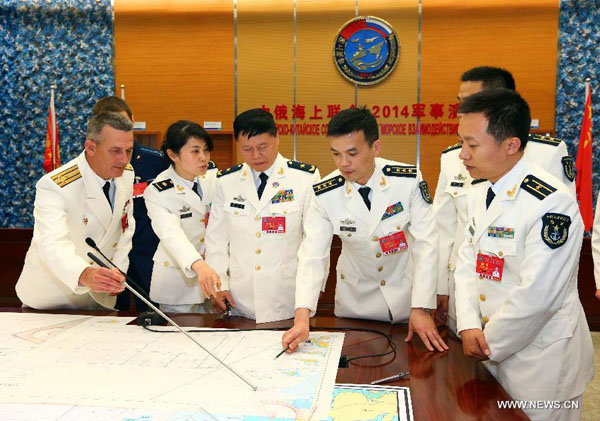China, Russia begin joint naval drills
 0 Comment(s)
0 Comment(s) Print
Print E-mail Xinhua, May 20, 2014
E-mail Xinhua, May 20, 2014
China and Russia began joint naval drills in the East China Sea off Shanghai on Tuesday, in a bid to deepen political trust between the two countries and their military cooperation.
|
 |
|
Directors of the Chinese and Russian naval forces arrange the deployment of forces in Shanghai, east China, May 20, 2014. The week-long China-Russia "Joint Sea-2014" exercise kicked off on Tuesday. A total of 14 vessels, two submarines, nine fixed-wing aircraft as well as helicopters and special forces from both sides will take part in the exercise. [Photo/Xinhua] |
Chinese President Xi Jinping and his Russian counterpart Vladimir Putin attended the launch of the naval exercise.
A total of 14 vessels, two submarines, nine fixed-wing aircraft as well as helicopters and special forces are taking part in the week-long "Joint Sea-2014" exercise.
Both China and Russia dispatched ships, including China's Zhengzhou and Ningbo missile destroyers and Russia's Varyag missile cruiser.
Xi said the joint exercise would showcase the two sides' resolve in responding to threats and challenges as well as safeguarding regional security and stability.
It would also display the new level of strategic mutual trust and coordination between the two countries, he said.
Putin, meanwhile, noted that the military ties are an important part of the Russia-China comprehensive strategic partnership of coordination, and called for enhanced cooperation to tackle various threats and challenges to safeguard regional and world peace and stability.
The China-Russia joint naval exercise is the third of its kind after joint drills off the coast of Russia's Far East in July 2013 and the Yellow Sea in April 2012.
Unlike drills in the previous two years, all Chinese and Russian vessels joining this week's naval exercise are mixed into three different groups, and are commanded by both Chinese and Russian commanders.
According to Wang Chao, head of a coordinating team from the Chinese navy, the mixed grouping illustrated "enhanced coordination between the two navies".
Navies of the two countries will join forces to simulate anchorage defense, maritime assaults, anti-submarine combats, air defense as well as identification, rescue and escort missions.
Li Shuyin, a research fellow with the Academy of Military Sciences, said the latest naval drills marked enhanced military cooperation between China and Russia in terms of both depth and scope.
"This is a clear show of enhanced mutual trust between the two militaries, and of increased transparency," Li said.
The fact that this year's joint exercise coincided with Vladimir Putin's China visit and the Conference on Interaction and Confidence Building Measures in Asia going on in Shanghai, also highlighted that "the comprehensive strategic partnership of coordination between Beijing and Moscow has reached a new high," he said.
Noting that China and Russia had held similar exercises over the past two years, Li said the drill has become a "routine and institutionalized cooperation mechanism between the two sides."
He said the joint naval drill was aimed at improving China and Russia's capacity in coping with maritime security threats, and signaled "the countries' resolve and confidence in jointly maintaining regional peace and stability."






Go to Forum >>0 Comment(s)